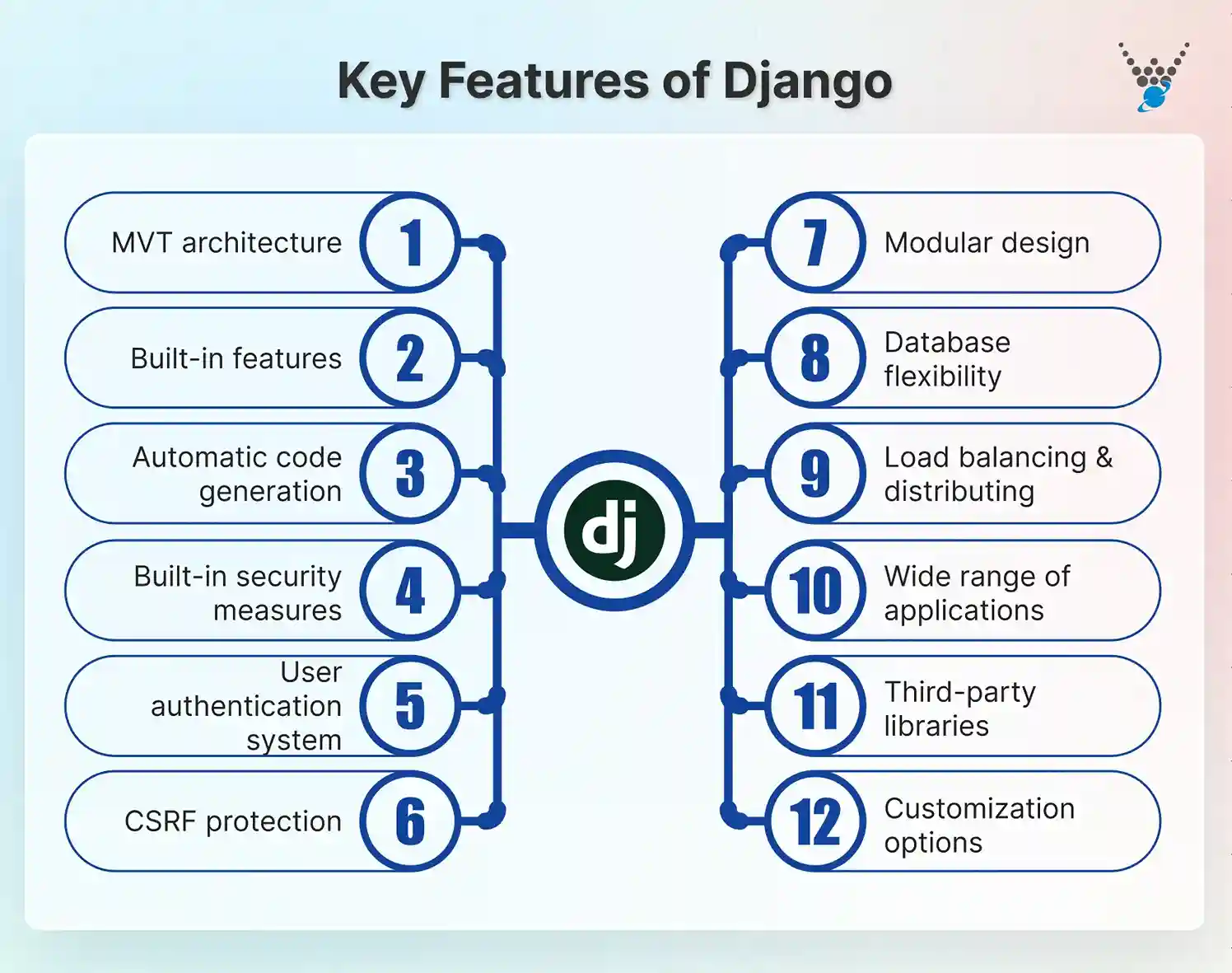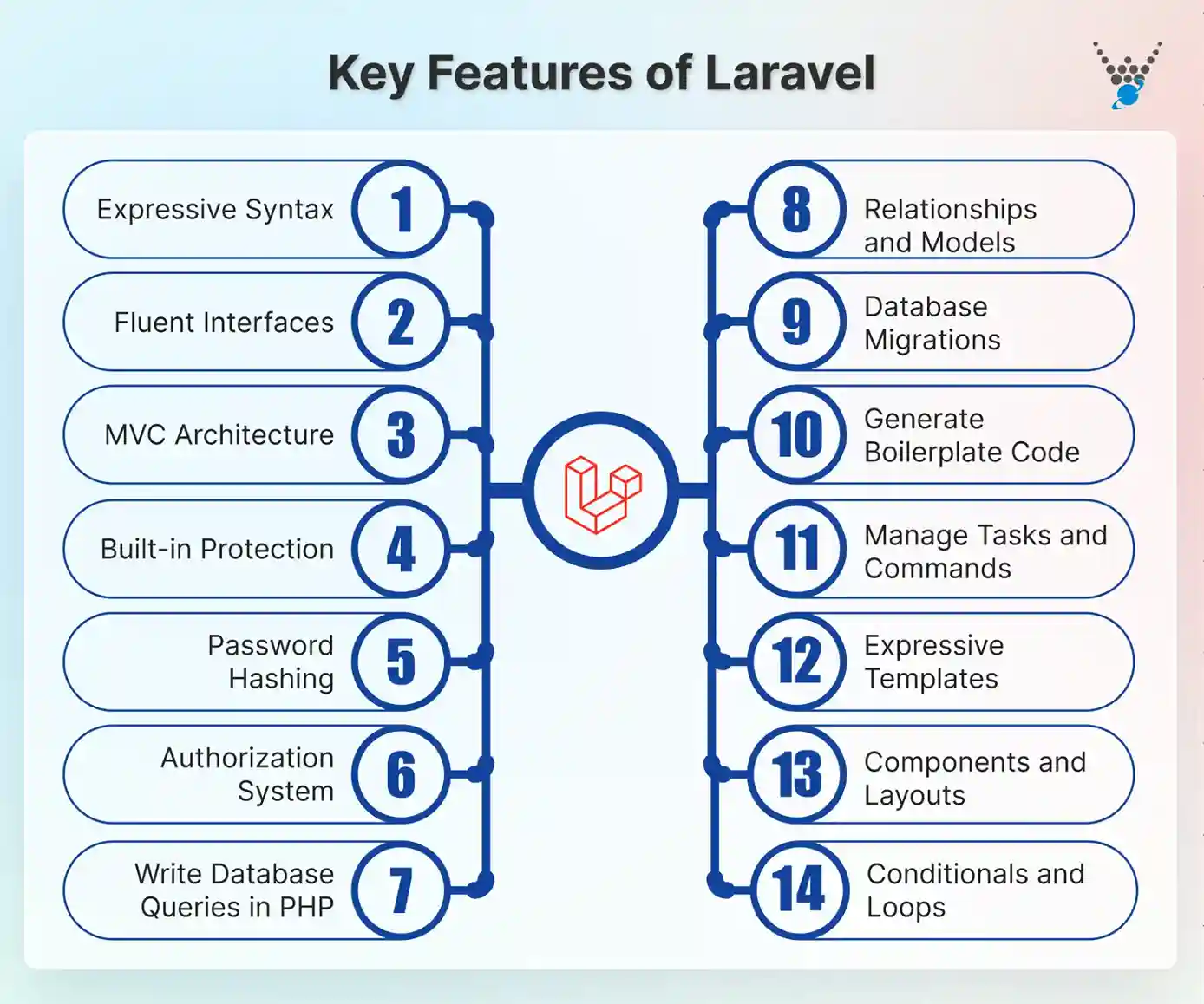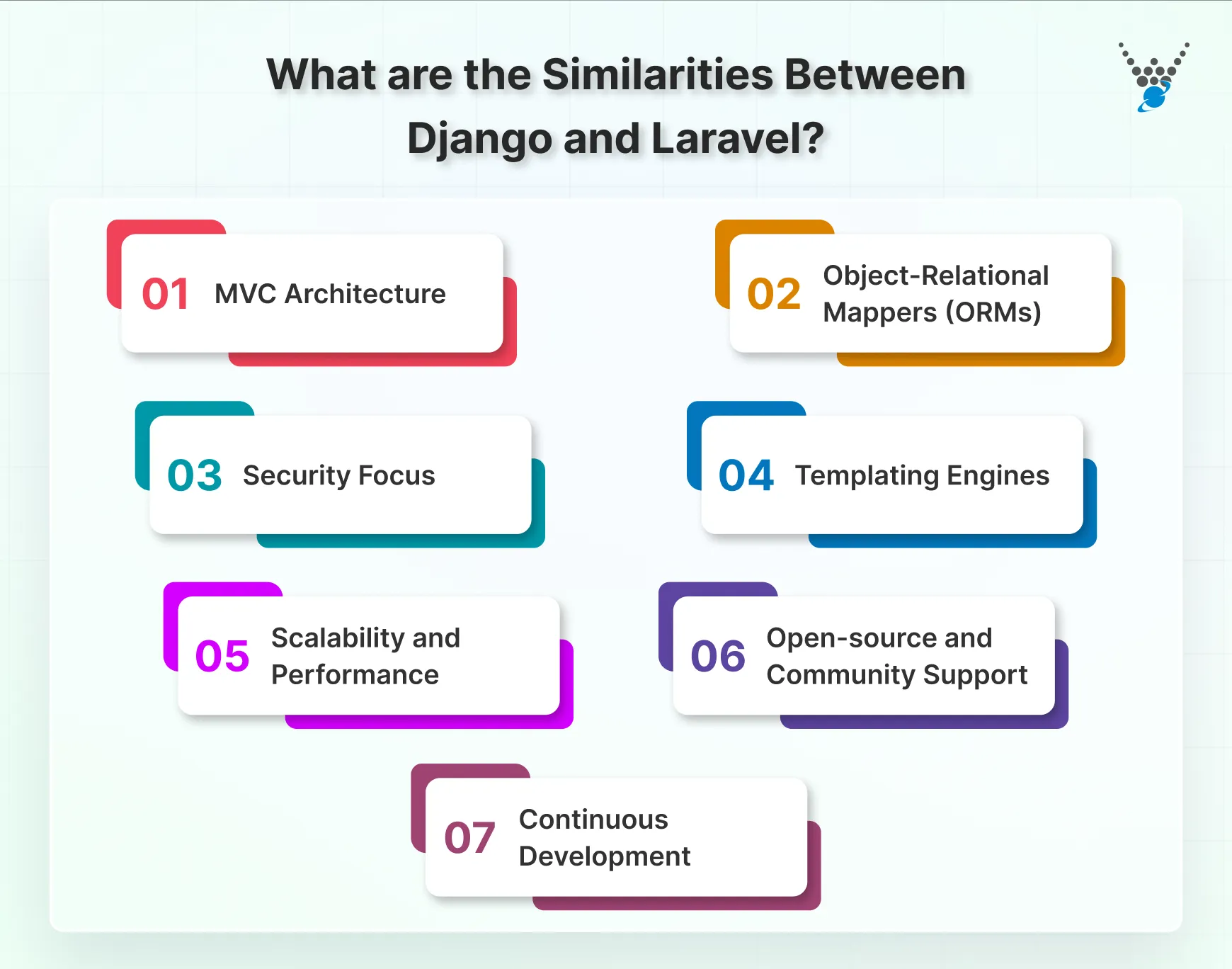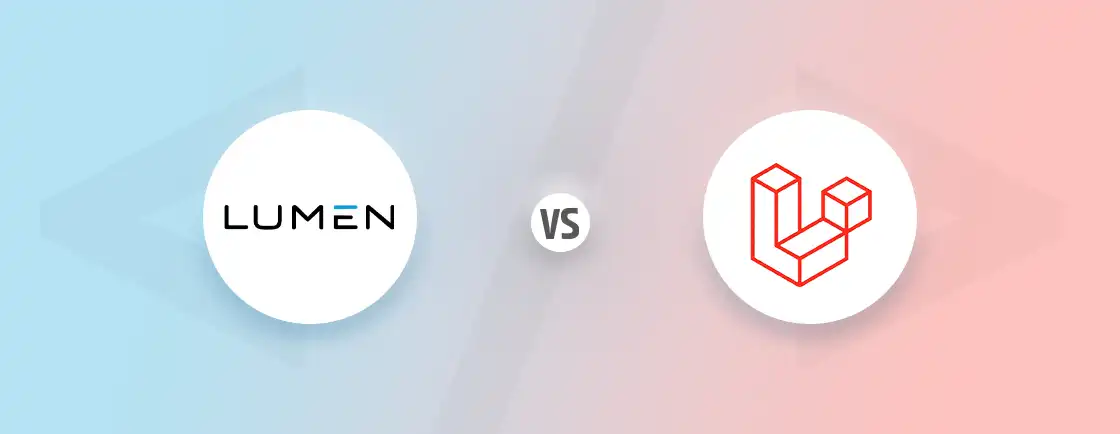Quick Summary
Curious whether Django or Laravel is right for your next web project? This blog compares and contrasts both frameworks, examining Django vs. Laravel in terms of performance, speed, key features, and real-world applications. From Instagram and NASA to BBC and 9GAG, see how top companies use them. Compare architecture, security, scalability, and flexibility to discover which web development framework best fits your project needs.
Table of Contents
When starting a custom web development project, the first step is usually to select the best web development framework for your needs. On that front, two of the most popular options are Django and Laravel. Django features and Laravel features are impressive, along with passionate communities, but their approaches diverge, leaving developers in a strategic quandary.
Django prioritizes efficiency with its robust ORM and MVT architecture for security and scalability. But Laravel offers elegant syntax and developer-friendly tools for flexibility and rapid development. Both offer distinct strengths, catering to diverse developer preferences and project requirements.
But how does Django vs Laravel go? Well, I will elaborate on it in this blog, along with the similarities. And I will also tell you which one the web experts prefer for their projects. Let’s begin with an overview of Django and Laravel.
Overview of Django
Django is a high-level web framework written in Python, known for its efficiency and rapid development capabilities. It helps developers build secure, maintainable, and scalable web applications quickly and efficiently. Django works on a “batteries-included” philosophy and includes a comprehensive set of tools and libraries for building web applications. That reduces the need for third-party libraries and boilerplate code.
Key Features of Django

- MVT architecture: Ensures clean code separation and promotes reusability.
- Built-in features: User authentication, database management, URL routing, admin interface, etc.
- Automatic code generation: Scaffolds boilerplate code, saving development time.
- Built-in security measures: Prevents common vulnerabilities like SQL injection and XSS.
- User authentication system: Secure login and authorization mechanisms.
- CSRF protection: Prevents unauthorized form submissions.
- Modular design: Easily scales to handle high traffic and complex features.
- Database flexibility: Supports various databases and caching mechanisms.
- Load balancing and distributed computing: Can be integrated for larger projects.
- Wide range of applications: Blogs, eCommerce, social networks, scientific computing, etc.
- Third-party libraries: Extends functionality and integrates with existing tools.
- Customization options: Tailors the framework to specific needs.
If these kinds of features are what you are looking for in your project, our expert web developers might be of help. But Laravel can be a good option for whether you want a website or web app. So, let’s look at an overview of Laravel.
Overview of Laravel
Laravel is a widely used open-source PHP framework that offers a simple and expressive syntax, making development both enjoyable and efficient. It includes a variety of Laravel features, like a modular packaging system and a dedicated dependency manager. Its robust capabilities make it a top contender in discussions about Laravel vs. Django performance.
Additionally, Laravel provides tools for routing, sessions, and authentication, streamlining common tasks in web development. Its elegant and readable codebase, along with its active developer community, have contributed to its widespread adoption.
Key Features of Laravel

- Expressive Syntax: Laravel code reads like natural PHP, making it easier to learn and maintain.
- Fluent Interfaces: Chain methods together for concise and readable code.
- MVC Architecture: Enforces code organization and promotes clarity.
- Built-in Protection: Guards against common web vulnerabilities like SQL injection and cross-site scripting.
- Password Hashing: Stores passwords securely using the Bcrypt algorithm.
- Authorization System: Granular control over user access and permissions.
- Write Database Queries in PHP: Simplify database interactions with intuitive syntax.
- Relationships and Models: Define object relationships for cleaner and more efficient code.
- Database Migrations: Manage database schema changes easily and securely.
- Generate Boilerplate Code: Scaffolding for controllers, models, migrations, and more.
- Manage Tasks and Commands: Automate common tasks like database migrations and user creation.
- Expressive Templates: Write clean and maintainable HTML with embedded PHP logic.
- Components and Layouts: Create reusable code blocks for consistent appearance.
- Conditionals and Loops: Easily control template content based on data and logic.
Overall, Laravel provides a flexible and expressive framework with robust security features. Plus, there’s an intuitive ORM and a powerful toolset for rapid development and customization. So, if you want Laravel for your website or web app, our Laravel development services would be perfect for your project.
So, want help with making the best of Laravel for your web application? Then get our pro Laravel development services to ensure the best results.
Next up, we’ll compare Django and Laravel in detail.
Django vs Laravel: Comparison Table
| Parameters | Django | Laravel |
|---|---|---|
| Programming Language | Python | PHP |
| Architecture | Model-View-Template (MVT) | Model-View-Controller (MVC) |
| Development Approach | “Batteries-included” with built-in tools | Flexible and customizable |
| Security | Strong out-of-the-box protection | Robust with built-in features and customization |
| Scalability | Highly scalable with modular design | Excellent scalability with load balancing and caching |
| Versatility | Suitable for a wide range of applications | Highly adaptable and flexible for various projects |
| Learning Curve | Moderate, requires Python knowledge | Easier to learn for PHP developers, steeper for beginners |
| Community | Large and active, with extensive documentation | Active and growing, with many community packages |
| Key Features | Django ORM, built-in user authentication, admin interface, SEO tools | Eloquent ORM, Artisan CLI, Blade templating engine, extensive packages |
| Most acceptablefor | Large, secure projects, content management systems, enterprise applications | Rapid prototyping, API development, custom applications with unique features |
Comprehensive Comparison Between Django and Laravel
When it comes to web development, Django and Laravel are two popular choices for building robust and dynamic websites. While both are powerful frameworks, they differ in many aspects. So, let’s compare two of the top backend technologies, Django and Laravel, based on a variety of factors.
Language and Framework
Django is based on Python, one of the most significant programming languages. It’s known for its readability, conciseness, and large library ecosystem, and offers a clean and elegant syntax. Django comes packed with powerful built-in features like user authentication, forms, database management, and URL routing. That streamlines development and reduces the need for additional libraries. However, it also leads to a less customizable experience.
On the other hand, Laravel is based on PHP and utilizes its flexibility, allowing for a high degree of customization and control over every aspect of the application.
Laravel provides a core framework with minimal built-in functionalities. You can choose and integrate the needed packages and tools. That leads to a more tailor-made development experience. This flexibility comes at the cost of initial configuration and potentially steeper learning curve.
Verdict: Django wins for ease of use and rapid development. But Laravel, based on PHP, ensures deep customization and control over the website or app.
Routing and URL Handling
Django utilizes regular expressions in Python code to define URL patterns and match incoming requests. This syntax can be more complex for beginners but allows for advanced pattern matching and control.
In Django, URL patterns map directly to view functions, which handle the request logic. This tight coupling can make it harder to separate request handling from the URL definition.
In contrast, Laravel uses a dedicated routing system where routes are defined in PHP files within the routes/ directory. This clear and organized setup promotes cleaner code and makes modifications easier. Developers can name routes for easy reference and group related routes together, improving both organization and code reusability.
Laravel offers built-in methods for extracting parameters from URLs. It simplifies data access in the controllers.
Verdict: Django offers flexibility and advanced URL parsing. That is ideal for developers comfortable with regular expressions and intricate request routing needs. But Laravel takes the lead for clarity and organization. That is good for beginners and those who prefer a dedicated configuration approach with named routes and groups.
Templating and Front-end Integration
Django offers a built-in templating engine with a familiar syntax similar to HTML. That comes with filters for data manipulation and inheritance for code reuse. There are also template tags for conditional logic and dynamic content.
Plus, Django integrates well with various JavaScript frameworks, like Angular, React, and Vue.js. You can embed the framework within templates or build separate components. It requires manual integration and management.
However, Laravel’s expressive and intuitive syntax with components and sections make for reusable code blocks. It offers conditional statements, loops, and directives for dynamic content.
Moreover, Laravel ships with built-in Blade directives for easy Vue.js data binding and component rendering. This tight integration simplifies communication between server-side templates and Vue.js components.
Verdict: Django is suitable for developers comfortable with manual integration and using various front-end frameworks. But Laravel is ideal for projects built with Vue.js or developers seeking a simplified front-end workflow.
Database Support
Django ships with its own ORM called Django ORM. That allows developers to write database queries using Python objects and relations. It simplifies data access and provides abstractions from the underlying database structure.
Plus, Django supports various popular databases like MySQL, PostgreSQL, SQLite, and MariaDB. Additionally, third-party packages can extend support to other database types. This framework also features a robust migration system for managing database schema changes. That ensures safe and controlled schema evolution over time.
On the flip side, Laravel utilizes its own Eloquent ORM. It offers an expressive and intuitive syntax for interacting with databases. Its query builder allows for both raw SQL and object-oriented approaches. Laravel supports similar database options as Django, including MySQL, PostgreSQL, SQLite, and MariaDB. And additional drivers can be added through community packages.
Verdict: Django’s ORM eliminates the need for writing raw SQL while still offering flexibility for complex queries. But Laravel Eloquent syntax can be more intuitive for some developers.And the option for raw SQL caters to advanced needs.
Built-in Features and Extensions
Following a “Batteries Included” approach, Django boasts a rich set of built-in features. They cover user authentication, forms, admin interface, database management, caching, URL routing, and more. That is one of the reasons why web experts opt for Django for their projects. They can quickly launch projects without relying on external libraries.
However, while Django packs a punch, its extension ecosystem caters to specific needs. Django Packages Index (PyPI) hosts diverse libraries addressing various functionalities, from analytics to social authentication.
On the other hand, Laravel offers a lean core with minimal built-in features. This allows for greater customization and control over application components. Developers can choose and integrate specific features through packages.
Laravel’s powerful Artisan command-line tool facilitates project management. It automates tasks like generating boilerplate code and managing migrations, and simplifies package installation. Laravel boasts a thriving package ecosystem with thousands of community-developed additions.
Some common examples are Laravel Forge, Scout, Valet, Telescope, Dusk, Jetstream, and more.
Verdict: Django wins for its ease of use and rapid development with extensive built-in features. But Laravel’s extensions and community-development add-ons offer better flexibility and customization.
Ultimately, the best framework is the one that empowers you to build your project efficiently and effectively. Choose the one that aligns with your goals and feels most comfortable for your development team.
Now that we have covered the differences between Django and Laravel, are there any similarities between them? Let’s find out in the next section.
What are the Similarities Between Django and Laravel?
Django and Laravel are distinct frameworks with their own strengths and weaknesses. But they also share some key similarities that make them both powerful tools for web development. Here are some noteworthy points of convergence:

- MVC Architecture: Both frameworks utilize the Model-View-Controller (MVC) architecture and separating data logic (models). There’s also presentation logic (views) and business logic (controllers). That promotes well-organized and maintainable codebases.
- Object-Relational Mappers (ORMs): Both Laravel and Django offer powerful ORMs – Eloquent and Django ORM respectively. They allow the developers to interact with databases using object-oriented syntax. It simplifies data access and reduces the need for raw SQL queries.
- Security Focus: Both frameworks prioritize security and provide built-in features to combat common web vulnerabilities like SQL injection and cross-site scripting. This allows developers to build secure applications without constantly worrying about security flaws.
- Templating Engines: Both Django and Laravel come with their own templating engines – Django Templates and Blade respectively. They enable developers to create dynamic and flexible user interfaces. These engines allow embedding logic within templates and generating dynamic content.
- Scalability and Performance: Both frameworks are well-suited for building high-traffic and complex web applications. They provide tools like caching and load balancing to ensure performance and scalability for demanding projects.
- Open-source and Community Support: Both frameworks are open-source and benefit from large and active communities. This means developers can access extensive documentation, tutorials, and community support whenever needed.
- Continuous Development: Both frameworks are actively maintained and undergo regular updates with new features and bug fixes. This ensures developers have access to the latest advancements and improvements.
Django and Laravel have their own unique strengths and appeal to different projects and developers. But their shared commitment to best practices make them both valuable tools for building modern web applications. The choice ultimately boils down to your specific project requirements, team skills, and development preferences.
Django vs Laravel: Real-world Usage Examples
When choosing a framework, seeing how it performs in real-world projects can be illuminating. Let’s explore some examples of websites and apps built with Django and Laravel.
Django Usage Examples
Django powers some of the biggest names on the web. For instance:
- Instagram: Handles billions of interactions daily. Django features and scalability make it perfect for social platforms.
- NASA: From data management to complex workflows, Django supports scientific projects at a global scale.
- Spotify: Django’s speed and robust architecture enable Spotify to manage large datasets and deliver smooth user experiences.
These examples highlight Django’s ability to manage complex operations efficiently. Its built-in features and strong architecture make it a go-to choice for high-traffic platforms.
Laravel Usage Examples
Laravel also shines in major real-world projects:
- BBC: Laravel powers parts of the BBC’s web services, delivering fast and dynamic content to millions of users.
- 9GAG: Manages interactive content and real-time updates smoothly, showing Laravel features in action.
- Pfizer: Laravel helps handle corporate web applications, managing sensitive data securely while offering flexibility.
Laravel’s strength lies in its flexibility and developer-friendly syntax. It adapts well to both content-heavy websites and custom applications.
Both frameworks are proven in the wild. Django excels in projects requiring heavy data handling, security, and high scalability. Laravel shines where flexibility, rapid development, and smooth content management are key. Seeing these real-world applications can help you make a confident choice for your own project.
How to Choose Between Django vs Laravel?
The choice between Django and Laravel is rarely about which is objectively “better.” It’s about which is the right tool for your specific project, team, and goals. Let’s check out which tool to choose and when.
Choose Django if:
- You prioritize speed and rapid development.
- You need a “batteries-included” framework with built-in features for user authentication, forms, admin interface, etc.
- You prefer a Python development environment.
- You value a cleaner and simpler codebase with built-in security features.
- Your project requires a structured and opinionated approach.
Choose Laravel if:
- You value flexibility and customization.
- You need a modular framework where you can choose and integrate specific features.
- You prefer a powerful command-line tool (Artisan) for project management and automation.
- You want seamless integration with Vue.js or other front-end frameworks.
- You have a larger development team with diverse preferences.
- Your project requires unique functionalities not readily available in built-in features.
There is no wrong choice. Both are elite frameworks capable of building outstanding applications.
So, agreed with either of these web development technologies? Then you opt for our web development company for the best results in your project.
Discover additional guides on popular web frameworks:
Let’s Summarize
The question of which framework is “better” is ultimately the wrong one to ask. Django and Laravel are not rivals but specialized instruments, each masterful in its own right. The superior choice is dictated entirely by the context of your project and team.
Django is for architects building robust, data-intensive systems where long-term stability, security, and scalability are non-negotiable. Laravel is for those who prioritize development speed, expressive code, and a modern, flexible ecosystem.
So, want to build the best web application with the suitable technology? Then connect with our web developers for hire today!
FAQs on Django vs Laravel
Is Django or Laravel better for building RESTful APIs?
Both Django and Laravel have built-in support for building RESTful APIs. However, Django has a more robust and mature REST framework, while Laravel’s API features are relatively new and may not have all the same features as Django.
Which has better security features: Django or Laravel?
Both Django and Laravel have strong security features, with each framework actively addressing any vulnerabilities that may arise. However, Django has a reputation for having stricter security measures and has been used by large organizations for handling sensitive data.
Which is more customizable: Django or Laravel?
Django and Laravel both offer a high level of customization. However, Laravel may be slightly more customizable as it has a wider range of packages and plugins available. Django, on the other hand, is known for its strict conventions and may require more effort to customize.
Which is easier for beginners: Django or Laravel?
Laravel can be easier for developers familiar with PHP because of its readable syntax and clear routing system. Django requires basic Python knowledge and understanding of MVT architecture, making its learning curve moderate. Both have strong communities and documentation to help beginners.
Is Django faster than Laravel?
Django often allows for quicker development out of the box, thanks to its built-in features and “batteries-included” approach. Laravel is highly flexible, but it may require additional setup, which can impact initial speed. Overall, Django is generally faster for rapid development, while Laravel shines in customization.
Django vs Laravel: Which is better for eCommerce?
For large, scalable eCommerce platforms, Django’s security, modularity, and performance make it ideal. Laravel works well for smaller or custom eCommerce sites, offering flexibility and smooth integration with front-end frameworks. The choice depends on project size and specific needs.
Can Django and Laravel be used together?
Not directly, as they are separate frameworks built on Python and PHP, respectively. However, you could use them for different parts of a project via APIs, microservices, or separate modules, but it adds complexity and requires careful planning.
Choose the Right Framework for Your Project
Unsure between Django and Laravel? Our experts can help you evaluate both and pick the best fit for your app goals.





